Apple’s iPhone has been kicking around since 2007 but it has changed significantly since then. There was only one model back then, and it didn’t even have 3G. Fast forward 17 years and we not only have four models in the latest iPhone 2024 lineup, but they are some of the best smartphones around with features we couldn’t even have imagined in 2007 when BlackBerry ruled the roost.
With those four models in the latest iPhone 16 series, you already have a tough decision on your hands. We’ve seen four models since the iPhone 12 series in 2020 however, so there are a considerable number of older iPhones out there too, some of which are still available through various retailers. Apple itself sells the iPhone SE, iPhone 14 and iPhone 14 Plus, and the iPhone 15 and iPhone 15 Plus, alongside the latest Phone 16, iPhone 16 Plus, iPhone 16 Pro and iPhone 16 Pro Max so when it comes to deciding which iPhone is right for you, it’s not straightforward.
I’ve been testing technology and Apple devices for over 12 years, and I owned the original iPhone and its 3G successor, before using every iPhone as my everyday device since the iPhone 6. In the last few years I have switched between the standard iPhone models and the iPhone Pro models so I’ve got plenty of experience with not only the latest iPhone 16 models, but all the older models too.
You can read my full reviews of the best iPhones below, followed by answers to frequently asked questions – but if you’re in a bit of a rush here’s a quick look at my top five based on the available iPhone 2024 lineup:
Which is the best iPhone in 2024? At a glance
- Best iPhone overall - iPhone 16
- Best value iPhone - iPhone 14
- Best iPhone camera - iPhone 16 Pro
- Best iPhone for largest screen - iPhone 16 Pro Max
- Best iPhone for battery - iPhone 16 Plus
Apple iPhone 16 Pro vs iPhone 16 - which is better?
It’s easy to assume the best iPhone is the top of the range, iPhone 16 Pro, and in many cases it is. I spoke to Ben Woods, chief analyst and CMO of CCS Insight, who has over 25 years experience in the mobile sector, who said: “My pick of the new models would be the iPhone 16 Pro (rather than the Max). You are investing in an iPhone with the best camera and a device that will support Apple Intelligence, which will continue to evolve for several years. Furthermore, when you come to trade it in, the residual value should hold up well.”
The iPhone 16 Pro model offers three camera lenses over two, so you get extra features like 5x optical zoom, and there’s higher resolution macro photography along with the ability to shoot 4K video at 120fps. You’ll also find a faster refresh rate display for a smoother scrolling experience than the iPhone 16, and a titanium build over aluminium.
The iPhone 16 offers many of the same main features as the iPhone 16 Pro however, including the same software experience with both running iOS 18, and the same user controls like the Action Button and the Camera Control button. The iPhone 16 is also cheaper and so while the iPhone 16 Pro is the better device overall, as Woods explains and as you would expect given the ‘Pro’ name, there are still plenty of reasons to opt for the standard iPhone 16 models, especially this year.
Why you can trust Telegraph Recommended
Our thorough, real-world tests will always help you find the best product at the best price. No manufacturer ever sees copy before publication and we do not accept payment in exchange for favourable reviews. Visit our Who We Are page to learn more.
How I tested the best iPhone
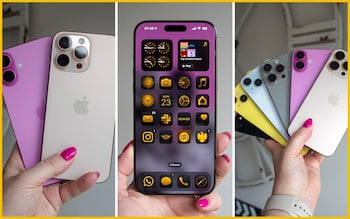
I’ve used all the iPhones below for at least a couple of weeks, and in many cases months, to help determine which is the best iPhone model overall, as well as which is the best iPhone to consider if you’re on a budget or you’re after something specific from your phone, such as great battery life or especially good camera performance.
I compared the camera results of all the models, their battery performance, the extras you get when you opt for one iPhone model over another, as well as what you get if you choose a newer model over an older model. I also looked at their display resolutions and technologies, affecting colour, detail and brightness, and their build quality and weight, affecting the overall user experience.
I used each iPhone for the same tasks during testing, from taking pictures and videos in the day and at night, running various apps, and streaming, watching and listening to content, to general day-to-day tasks like taking calls and sending messages and emails.
Best iPhone 2024
1. Apple iPhone 16 and iPhone 16 Plus
From £799, John Lewis
Best iPhone overall, 10/10
We like: the excellent upgrades over last year’s models and super battery life in the Plus model
We don’t like: that there is no Always-On Display and a 60Hz refresh rate
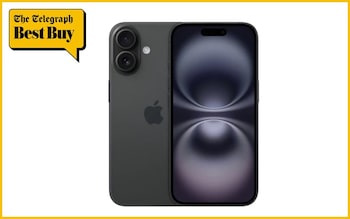
- Screen: 6.1in / 6.7in, Super Retina XDR OLED, 60hz refresh rate
- Cameras: Dual (48MP Main and 12MP Ultra Wide), 12MP selfie camera
- Processor: Apple A18 Bionic
- Storage: 128GB, 256GB, 512GB
- Dimensions: 147.6 x 71.6 x 7.8mm / 160.9 x 77.8 x 7.8mm
- Weight: 170g / 199g
- Battery life: Up to 22 hours / Up to 27 hours
- Colours: Black, White, Pink, Teal, Ultramarine
The Apple iPhone 16 and iPhone 16 might miss out on a couple of features compared to the iPhone 16 Pro models below, but what they do offer, coupled with their lower prices and excellent performance, make them very compelling options and very recommendable. The camera performance from the two rear lenses is great, and while you don’t get 5x optical zoom like the Pro models, you do get 2x.
The OLED displays offer plenty of pop, good detail and there’s ample brightness too, while the 6.1-inch and 6.7-inch size options make good use of the available footprint. The aluminium frames result in lightweight and easy to manage devices, whichever model you choose, and the colour options are striking. There’s black and white for those that are looking for something a bit more subtle, but the Ultramarine, Teal and Pink are stunning in the flesh, with much more pop than the Pros.
It’s the fact that the iPhone 16 and iPhone 16 Plus get the Action Button that was first offered on the iPhone 15 Pro models last year, the new Camera Control button, and support for Apple Intelligence, that makes them so great this year, however. Yes, they miss out on a faster refresh rate display, an extra camera sensor, a couple of extra features and bigger displays, but that’s about all. When it comes to overall experience, the Phone 16 and iPhone 16 Plus get nearly everything the Pro models do, with the Action Button offering quick access to a favourite app or feature, while the Camera Control button adds convenience for the camera and its tools.
Battery life has improved on all iPhone 16 models – as have charging speeds, but I found the battery particularly impressive on the iPhone 16 Plus so if its battery life you’re after, it’s the iPhone 16 Plus I would pick. Apple Intelligence will come to the iPhone 16 and iPhone 16 Plus later this year too, which will bring features like Clean Up for removing unwanted objects in images, Writing Tools, natural language search and a more personal Siri, so there’s more to come. The iPhone 16 and 16 Plus are already excellent though, and they have very much narrowed the gap between standard and Pro this year.
2. Apple iPhone 14
From £599, John Lewis
Best value iPhone, 8/10
We like: there’s good performance and good value for money
We don’t like: there’s no USB-C and the notch at the top of the screen isn’t as nice as the design in the newer models
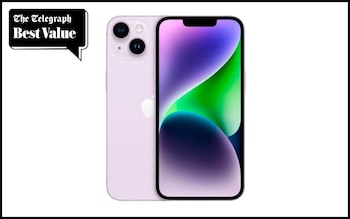
- Screen: 6.1in / 6.7in, Super Retina XDR OLED, 60hz refresh rate
- Cameras: Dual (12MP Main, 12MP Ultra Wide), 12MP selfie camera
- Processor: Apple A15 Bionic
- Storage: 128GB, 256GB, 512GB
- Dimensions: 146.7 x 71.5 x 7.8mm / 160.8 x 78.1 x 7.8mm
- Weight: 172g / 203g
- Battery life: Up to 20 hours / Up to 26 hours
- Colours: Midnight, Starlight, Blue, Purple, Yellow, (PRODUCT)RED
The Apple iPhone 14 and 14 Plus support the latest software – iOS 18 – so they deliver a similar user experience and many of the same iPhone features as the other iPhones within this round-up, but for quite a bit less money these days. Camera results are decent, there are punchy and vibrant displays and there’s a smooth performance too, resulting in a good overall experience from the iPhone 14 and 14 Plus.
Compared to the iPhone SE below, the iPhone 14 and iPhone 14 Plus also offer safety features like Crash Detection and Messages via satellite, so while you don’t get some of the newer experiences like Apple Intelligence or spatial video recording, which you can playback through the Apple Vision Pro, you do get a device that performs well on most counts.
“If you are chasing value I’d go for the iPhone 14”, Woods recommends and I agree. The iPhone 14 and 14 Plus miss out on a couple of things compared to the iPhone 15 models, but they are cheaper and still solid offerings with software support expected for at least another few years. Plus, given the iPhone 15 models don’t support Apple Intelligence either, you can save quite a bit opting for the iPhone 14 or iPhone 14 Plus instead.
3. Apple iPhone 16 Pro and iPhone 16 Pro Max
From £999, John Lewis
Best iPhone camera, 9/10
We like: the superb camera results and excellent overall performance
We don’t like: the low starting storage for the iPhone 16 Pro
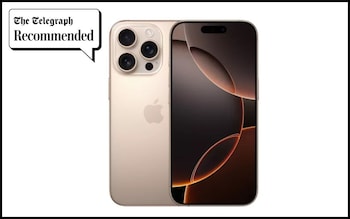
- Screen: 6.3in / 6.9in, Super Retina XDR OLED, 120hz refresh rate
- Cameras: Triple (48MP Main, 48MP Ultra Wide and 12MP Telephoto), 12MP selfie camera
- Processor: Apple A18 Pro Bionic
- Storage: 128GB (iPhone 16 Pro only), 256GB, 512GB, 1TB
- Dimensions: 149.6 x 71.5 x 8.3mm / 163 x 77.6 x 8.25mm
- Weight: 199g / 227g
- Battery life: Up to 27 hours / Up to 33 hours
- Colours: Black Titanium, White Titanium, Natural Titanium, Desert Titanium
The Apple iPhone 16 Pro models are excellent and as Woods says, they are the iPhone models with the best camera so if camera performance is your number one priority, it’s the iPhone 16 Pro or iPhone 16 Pro Max you’ll want. Results in good conditions are superb, with natural colour representation and great detail, and low light shots are impressive too. There’s also higher resolution macro photography in these models, making for some fabulous flower, food and furry friend shots, while shooting at 4K 120fps is good fun with great results.
The Camera Control button on the right edge makes for an easy way to access the camera, take photos or shoot video, as well as switch between the various tools, zoom and lenses, and although it takes a bit of time to get used to, it’s a nice addition. The Action Button on the left also offers one-tap access to another app or feature of your choosing like the iPhone 16 models, and while it could do more, like offer functions for double tap and triple tap, it’s something I use on a daily basis.
The iPhone 16 Pro and 16 Pro Max’s titanium frames deliver premium builds and the colour options are lovely, especially in the case of the Desert Titanium and Black Titanium. Meanwhile, the larger displays – now expanded to 6.3-inches and 6.9-inches – are glorious with super slim bezels around their edges, rich and vibrant colours, plenty of detail and lashings of brightness. The brightness now drops to 1 nits too, which is excellent for night time viewing, while the 120Hz refresh rate makes everything buttery smooth, whether you’re gaming or browsing the web.
Overall performance is excellent too, and in all honesty, there’s very little to complain about here. The 128GB starting storage of the smaller iPhone 16 Pro is low for the price, and the iPhone 16 models offer a lot for a cheaper price, but that’s most of the negatives covered. The battery life improvements mean the Pro models both more than see you through a day, and the iPhone 16 Pro Max easily goes into the following day. As with the iPhone 16s, there’s more to come from these models too when Apple Intelligence arrives so they are only set to get better and offer more features as the months and years go on.
4. Apple iPhone 15 Pro
From £899, Argos
Best iPhone for Pro features on a budget, 9/10
We like: it offers great performance on all counts and will support Apple Intelligence
We don’t like: it’s still quite pricey, despite being older
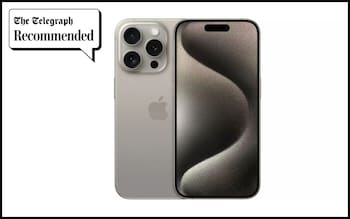
- Screen: 6.1in / 6.7in, Super Retina XDR OLED, 120hz refresh rate
- Cameras: Triple (48MP Main, 12MP Ultra Wide and 12MP Telephoto), 12MP selfie camera
- Processor: Apple A17 Pro Bionic
- Storage: 128GB (iPhone 15 Pro only), 256GB, 512GB, 1TB
- Dimensions: 146.6 x 70.6 x 8.3mm / 159.9 x 76.7 x 8.25mm
- Weight: 187g / 221g
- Battery life: Up to 23 hours / Up to 29 hours
- Colours: Black Titanium, White Titanium, Natural Titanium, Blue Titanium
Apple doesn’t sell the iPhone 15 Pro or 15 Pro Max anymore, but other retailers still have stock and if you can get hold of it, it’s a better option to buy than the iPhone 15 models below. The reason for this isn’t just the extra camera lens and power, but the iPhone 15 Pro models will support Apple Intelligence, like the iPhone 16 and iPhone 16 Pro models above.
There aren’t huge differences between the iPhone 15 Pro and iPhone 16 Pro either, so while you miss out on the larger displays with slimmer bezels, the Camera Control button for easier access to camera tools and functions, and the upgraded Ultra Wide camera lens, there’s plenty on offer with last year’s models.
Camera performance is excellent on the iPhone 15 Pro model, especially in the iPhone 15 Pro Max with its 5x optical zoom capabilities, and performance is superb too. If you want an iPhone Pro, but the iPhone 16 Pro is a little out of reach in terms of price, the iPhone 15 Pro and Pro Max are well worth considering.
5. Apple iPhone 15
From £699, Currys
Best iPhone for a newer design on a budget, 8/10
We like: it has good camera performance and a lightweight design
We don’t like: doesn’t support Apple Intelligence
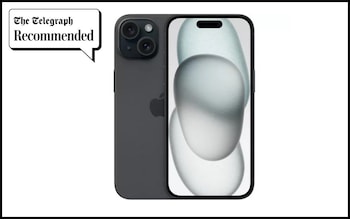
- Screen: 6.1in / 6.7in, Super Retina XDR OLED, 60hz refresh rate
- Cameras: Dual (48MP Main, 12MP Ultra Wide), 12MP selfie camera
- Processor: Apple A16 Bionic
- Storage: 128GB, 256GB, 512GB
- Dimensions: 147.6 x 71.6 x 7.8mm / 160.9 x 77.8 x 7.8mm
- Weight: 171g / 201g
- Battery life: Up to 20 hours / Up to 26 hours
- Colours: Black, Blue, Green, Yellow, Pink
The Apple iPhone 15 and iPhone 15 Plus ditched the notch at the top of their displays and introduced the Dynamic Island feature that first arrived on the iPhone 14 Pro models the year prior. That feature is great when it comes to multitasking on iPhone, enabling you to access music controls, timers, alarms and other elements like voice recordings through the pill-shaped interface at the top of the screen, without having to leave the main display. It also gives the iPhone 15 models a different look compared to older standard iPhones.
Camera and battery performance are good too, and the aluminium frame makes for a lightweight build that’s comfortable to hold, and subtle in design with a range of pastel colour options. The Ultra Wide camera sensor was also improved in the iPhone 15 models compared to the iPhone 14 models, allowing for 2x optical zoom without the need for a telephoto lens, and the display is also brighter, so they are better when using on a bright, sunny day.
There is something you need to keep in mind if you buy the iPhone 15 or iPhone 15 Plus however, and that’s that neither model will support Apple Intelligence when it launches later this year. They don’t have the processing power to run the on-device intelligence, which includes Clean Up in photos, similar to Magic Eraser on the Google Pixel 9, along with Writing Tools and a smarter Siri. It means if your budget can stretch to any of the models mentioned above, they are the better buys to future proof your phone for a couple of years.
6. Apple iPhone SE
From £429, John Lewis
Best budget iPhone, 6/10
We like: it’s slim, lightweight and affordable
We don’t like: it misses out on several features and its design looks dated now
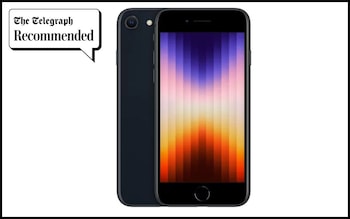
- Screen: 4.7in Retina HD LCD, 60hz refresh rate
- Cameras: Single (12MP Main), 7MP selfie camera
- Processor: Apple A15 Bionic
- Storage: 64GB, 128GB, 256GB
- Dimensions: 138.4 x 67.3 x 7.3mm
- Weight: 144g
- Battery life: Up to 20 hours / Up to 26 hours
- Colours: Midnight, Starlight, red
The iPhone SE is still sold by Apple, but it’s several years old now and it looks like it too, with a design that’s the same as the iPhone 6 that launched back in 2014. There are large bezels at the top and bottom of the screen and a single camera on the back so it’s nowhere near as accomplished as other iPhone models.
It is priced more affordably, and one of the cheapest ways to get an iPhone, but as Wood points out: “If you are chasing value I’d go for the iPhone 14. This is because rumours are currently pointing to Apple updating the iPhone SE in the first half of 2025.”
The iPhone SE (3rd generation) does support 5G, it’s compact and lightweight, and it has features like Apple Pay so it still does general day-to-day things without a problem. It loses out on a number of features however, including Night Mode, making low light photography tricky, not to mention it offers quite a small display for its footprint. If this is as far as your budget can stretch, I’d highly recommend trying to get an iPhone 13 mini instead.
iPhone FAQs
How much internal storage does each iPhone have?
It depends on the iPhone you choose as to how much storage there is available, but options start at 64GB and go up to 1TB if you consider the entire range.
The iPhone SE is the only model to have 64GB, and it only goes up to 256GB. The standard iPhone models – 14, 15 and 16s – all come in 128GB, 256GB or 512GB options. The iPhone 15 Pro and iPhone 16 Pro come in 128GB, 256GB, 512GB and 1TB, while the iPhone 15 Pro Max and iPhone 16 Pro Max come in 256GB, 512GB and 1TB options.
What are the main differences between the iPhone SE, iPhone 14, iPhone 15, iPhone 16, and iPhone 16 Pro Max?
There are differences in designs, camera offerings, processors and features across the iPhone SE, iPhone 14, iPhone 15, iPhone 16 and iPhone 16 Pro models. The main differences are the Pro models have titanium builds over aluminium and have three camera lenses on the rear.
The iPhone SE has the old design with a home button at the bottom of the screen, while the iPhone 14 has a notch at the top of the display. The iPhone 15 models moved to the Dynamic Island design and upgraded the camera, while the iPhone 16 models support Apple Intelligence and add the Camera Control button and Action Button. That’s it in a nutshell, but Apple’s comparison website lets you scan through each difference between any iPhone model.
Which iPhone models support the latest iOS?
The latest iOS is IOS 18, which is supported by the following iPhone models:
- iPhone 16, iPhone 16 Plus, iPhone 16 Pro, iPhone 16 Pro Max
- iPhone 15, iPhone 15 Plus, iPhone 15 Pro, iPhone 15 Pro Max
- iPhone 14, iPhone 14 Plus, iPhone 14 Pro,iPhone 14 Pro Max
- iPhone 13, iPhone 13 mini, iPhone 13 Pro, iPhone 13 Pro Max
- iPhone 12, iPhone 12 mini, iPhone 12 Pro, iPhone 12 Pro Max
- iPhone 11, iPhone 11 Pro, iPhone 11 Pro Max
- iPhone XS, iPhone XS Max
- iPhone XR
- iPhone SE (2nd generation or later)
What are the new features on the latest iPhone?
The latest iPhone 16 models add a Camera Control button on the right edge for controlling the cameras and their tools, which is the biggest physical difference of note, though the 16 Pro and 16 Pro Max also have slimmer bezels around the screens and larger displays. All models also have the Action Button in place of the silent toggle on the left edge.
There are also improved cameras, improved batteries, more advanced processors and improved charging speeds across all four models, as well as better microphones and a feature called Audio Mix for editing audio on videos. The iPhone 16 Pro models also introduce the ability to record 4K 120fps video. All four models run on iOS 18 and they will all support Apple Intelligence when it arrives in the UK supporting UK English in December.
Is the new iPhone compatible with other Apple products?
Yes, all the new iPhones are compatible with other Apple products. They work brilliantly with Apple Watch and AirPods for example, but there are also a range of features that make for a seamless experience between iPhone and MacBook. My favourite is the ability to copy on your MacBook and paste directly on your iPhone thanks to a feature called Continuity, but you can also use your iPhone to immediately scan documents you’re attaching to an email on your MacBook for example, take calls or answer messages. With iOS 18 and macOS Sequoia, you will also be able to use iPhone Screen Mirroring, allowing you to completely control your iPhone from your Mac so long as your iPhone is on the same Wi-Fi network and within Bluetooth range.
What is Apple Intelligence and what iPhones is it available on?
Apple Intelligence is Apple’s take on artificial intelligence, like Google’s Gemini that is built into its latest Pixel phones and Samsung’s Galaxy AI that you’ll find baked into its more recent smartwatches and phones. When it was announced, Apple CEO, Tim Cook said: “Apple Intelligence will transform what users can do with our products — and what our products can do for our users. Our unique approach combines generative AI with a user’s personal context to deliver truly helpful intelligence.”
It will be integrated into the systems of iPhone, iPad and Mac, and it includes features like a more personalised Siri that you can type to ask, Clean Up in photos to remove things like a bin or car from your shot, and Priority Messages in Mail that filters out important emails. Apple Intelligence will also offer Writing Tools across a range of apps, Priority Notifications to filter out important notifications and things like Live Transcription for calls.
You’ll need an iPhone 16. iPhone 16 Plus, iPhone 16 Pro, iPhone 16 Pro Max, iPhone 15 Pro or iPhone 15 Pro Max to get access to Apple Intelligence when it arrives.
Disclaimer: The copyright of this article belongs to the original author. Reposting this article is solely for the purpose of information dissemination and does not constitute any investment advice. If there is any infringement, please contact us immediately. We will make corrections or deletions as necessary. Thank you.



